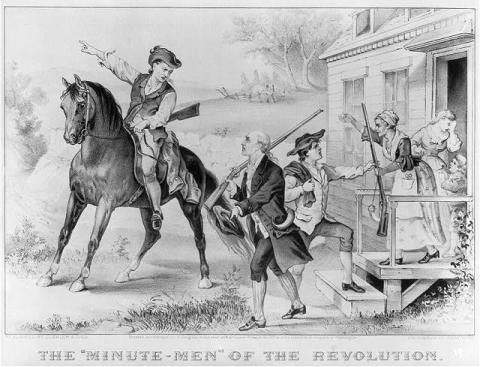-
Table of Contents
- 0. STORY PREFACE
- 1. TAXATION WITHOUT REPRESENTATION
- 2. THE BOSTON MASSACRE
- 3. COLONISTS REBEL
- 4. LET IT BEGIN HERE
- 5. LEXINGTON AND CONCORD
- 6. THE BATTLE OF BUNKER HILL
- 7. WASHINGTON TAKES COMMAND
- 8. AMERICA ESTABLISHES A NAVY
- 9. DRAFTING THE DECLARATION
- 10. THE VOTE: 13-0
- 11. AMERICA'S FIRST DOLLARS
- 12. LONDON'S REACTION
- 13. TREASON
- 14. TREASON MOST FOUL
- 15. EXECUTIONS
- 16. MARION'S BRIGADE
- 17. THE TABLES TURN
- 18. SURRENDER AT YORKTOWN
- 19. GENERAL WASHINGTON RESIGNS
- 20. UNANIMOUS PRESIDENTIAL ELECTION
Currier & Ives created this lithograph—“The ‘Minute Men’ of the Revolution”—circa 1876, to commemorate the 100th anniversary of America’s independence from Britain. The Library of Congress, which maintains this illustration, provides a description: “Print shows a man on horseback pointing to the distance as two other men prepare to leave with their rifles. A woman on the porch passes a rifle to one man as a younger woman with a child looks distraught.”
Overhearing a plan that Gage was sending troops to Concord (where the colonials had a supply depot), Joseph Warren told Paul Revere to warn the citizens. Of special concern was the safety of Hancock and Sam Adams. They were hiding in Lexington, a small town on the way to Concord.
The patriots needed to know how the British would march. Were they coming by land or sea? At a time when it took five days to travel between Philadelphia and Baltimore, Revere used another method, immortalized in a poem by Henry Wadsworth Longfellow.
Revere's friend would hang a lantern in the steeple of Christ Church (now the Old North Church in Boston's North End):
One if by land, and two if by sea;
And I on the opposite shore will be,
Ready to ride and spread the alarm
Through every Middlesex village and farm,
For the country folk to be up and to arm.
Only ... it wasn't Paul Revere who rode all the way.
He and one companion, William Dawes, were captured in Lincoln (after they had warned the folks in Lexington, around midnight, and were on their way to Concord).
Dr. Samuel Prescott, the third rider, made it to Concord hours ahead of 700 British soldiers who - as they marched - heard ringing church bells calling the patriots to arms. (Not long after Revere's capture his wife, Rachel, sent him money— 125 pounds—and warned him to "not attempt coming into this town again.")
By the time an advance guard of British soldiers arrived in Lexington (at 4:30 a.m. on April 19, 1775), half the colonial men who had previously gathered on Lexington Green were home. But Captain John Parker was still there, ready to command his "troops" - 77 Minutemen (the name comes from "men ready at a moment's notice") whom Parker had earlier told:
Stand your ground. Don't fire unless fired upon, but if they mean to have a war, let it begin here.
-
Table of Contents
- 0. STORY PREFACE
- 1. TAXATION WITHOUT REPRESENTATION
- 2. THE BOSTON MASSACRE
- 3. COLONISTS REBEL
- 4. LET IT BEGIN HERE
- 5. LEXINGTON AND CONCORD
- 6. THE BATTLE OF BUNKER HILL
- 7. WASHINGTON TAKES COMMAND
- 8. AMERICA ESTABLISHES A NAVY
- 9. DRAFTING THE DECLARATION
- 10. THE VOTE: 13-0
- 11. AMERICA'S FIRST DOLLARS
- 12. LONDON'S REACTION
- 13. TREASON
- 14. TREASON MOST FOUL
- 15. EXECUTIONS
- 16. MARION'S BRIGADE
- 17. THE TABLES TURN
- 18. SURRENDER AT YORKTOWN
- 19. GENERAL WASHINGTON RESIGNS
- 20. UNANIMOUS PRESIDENTIAL ELECTION


 Back
Back
 Next Chapter
Next Chapter

 Back
Back
 Next Chapter
Next Chapter

